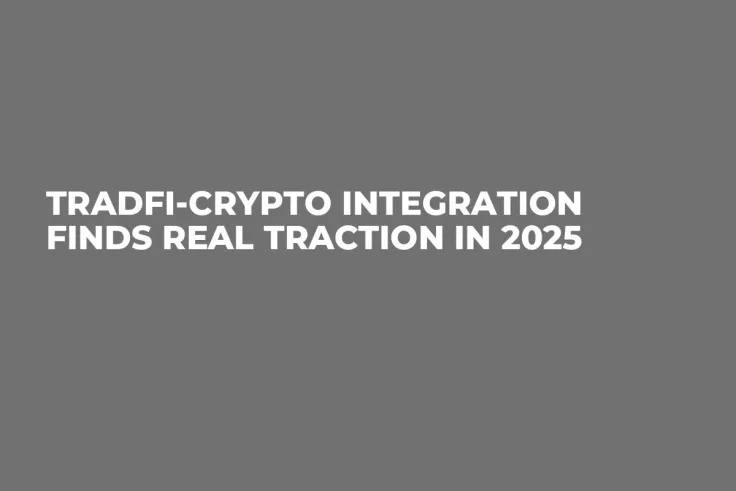
Disclaimer: The opinions expressed by our writers are their own and do not represent the views of U.Today. The financial and market information provided on U.Today is intended for informational purposes only. U.Today is not liable for any financial losses incurred while trading cryptocurrencies. Conduct your own research by contacting financial experts before making any investment decisions. We believe that all content is accurate as of the date of publication, but certain offers mentioned may no longer be available.
Over the past year and a half, the world’s largest financial institutions have doubled down on building the ‘connective tissue’ linking trad-fi to the blockchain. Unlike the hype cycles of 2017 or 2021, which saw market volatility hit an all-time high, current evolutionary trends are being shaped behind the scenes via avenues like tokenization pilots, compliance rails, custody frameworks, and large-scale onboarding of capital.
To this point, by Q2 2025, over 85% of global banks surveyed by the World Economic Forum (WEF) had either launched or were actively testing tokenized asset infrastructures. In this context, JPMorgan’s Onyx, HSBC’s Orion, and Citi’s tokenization labs are not outliers but indicators of an industry-wide pivot, especially as the total market cap of tokenized treasuries, bonds, and private debt surpassed the $25 billion mark globally recently(up from $3 billion just a couple of years ago).
What’s more compelling is the composition of this growth, as nearly half of these assets now reside on public or hybrid blockchains, with the most significant driver behind this expansion being tokenized private credit, which, unlike today’s unpredictable crypto lending mechanisms, is built on established loan structures with tangible collateral backing.
Today, private credit is dominating the tokenized RWA landscape, accounting for roughly $14 billion of the total $25 billion market. As a result, tokenization no longer seems like a theoretical promise (nor does trad-fi’s entry into crypto feel like a mere headline) but rather the groundwork for a new global financial layer seems to be coming alive with each passing day.
Creating a global infrastructure for inclusive yields
In the wake of this ongoing shift, products like VALR’s USD Private Credit Token (USDPC) are ushering in a turning point not just for crypto yield offerings, but for who gets to participate within the global financial fray because for years, products like private credit funds (offering 8–10% returns backed by senior secured loans) have typically been walled off behind six-figure minimums, opaque documentation, and long lock-in periods.
With the launch of USDPC, global crypto exchange VALR is collapsing those barriers, partnering with Canadian private credit firm Garrington Capital, to offer users exposure to a diversified pool of U.S.-based private loans. Beyond its 8–10% yield, another big advantage is that investors can access the product in small USD denominations.
For retail investors across Europe, Southeast Asia, Latin America, and even underserved regions, this represents a unique proposition wherein investors can earn in dollars, access institutional-grade credit, while being able to do all of this through a fast-scaling global exchange trusted by users in over 100 countries.
What also sets USDPC apart is its structural integrity since the loans backing the token consist of commercial receivables, inventory-backed lines of credit, equipment loans, and the manager, Garrington, has a track record stretching back more than 15 years without a single negative quarter.
Redemptions are handled through VALR’s OTC desk with flexible timelines (ranging from 7 days to 30 days based on liquidity), and the token will soon be integrated into VALR Invest, the platform’s upcoming product suite for wealth-building tools. Moreover, there are no direct management fees levied on users, just a spread built into the buy-sell pricing and a performance incentive for the fund manager.
A sign of things to come?
From the outside looking in, USDPC is a microcosm of where crypto and TradFi are headed, proving that tokenization is not just for experimentation but rather for distribution. By opening access to real-world yield products, VALR isn't just responding to global trends but rather positioning itself as a next-gen global leader, advancing the tokenization of credit and the decentralization of yield for a truly international user base.

 Dan Burgin
Dan Burgin Vladislav Sopov
Vladislav Sopov